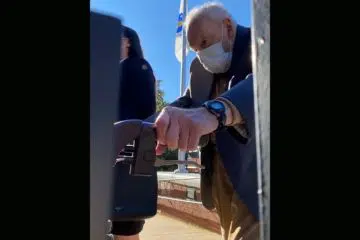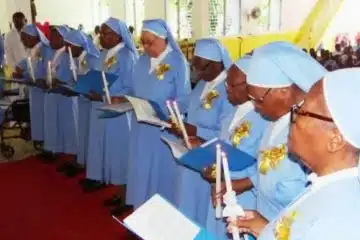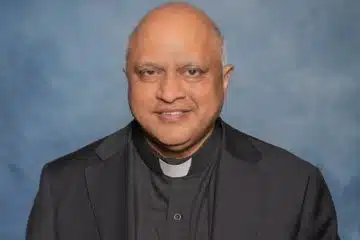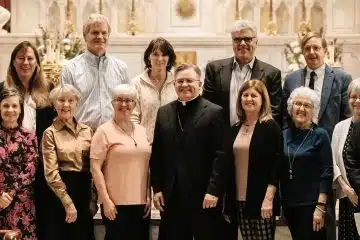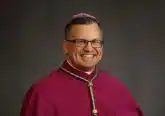Archdiocesan staffer participates in CRS trip to Africa
November 21, 2011
By Pam Long
ARCHDIOCESE — Who would think that bringing water into a community could set off such a profound ripple effect to the health, safety and education of its residents?
 |
| Children in the village of Minta greeted a delegation of Catholic Relief Services diocesan directors with handmade signs reading CRS and USDA (the U.S. Department of Agriculture). (Courtesy photo) |
Who would expect that a $350 gross profit on a $20 microfinance loan would allow a woman farmer to pay for her daughter’s wedding and her sons’ education?
These are some of the amazing “photographs” that remain with me after traveling on a Catholic Relief Services (CRS) trip organized by Kim Mazyck and Michael Trujillo for diocesan directors to the west African countries of Burkina Faso and Mali in September.
What I wasn’t ready for was the physical intensity of the poor and vulnerable to survive in a climate where hot and humid is a permanent forecast.
“Our children are not hungry, not thirsty, not crying,” one mother said about the benefits of a water improvement project in the Mali village of Minta.
The water improvement project also translates into a significant decrease in diarrhea, a life-threatening illness in Africa, killing one out of every five children, said village and CRS officials.
The water improvement project means girls and women will no longer risk sexual assault as they walk four miles over sometimes rocky terrain to get water, said Timothy Bishop, the CRS country representative in Mali.
The young girls and women now can receive an education, a development praised by mothers who are on the village’s school committee.
“A girl who is educated can better take care of herself and her family. She can go out and get a job, and even if she doesn’t get a job, she can manage her family’s affairs better,” one mother said.
 |
||
| Awa Coulibaly turned a $20 CRS microloan into $352 by farming okra, beans and peanuts in Minta, Mali. She was able to pay her daughter’s wedding expenses and her sons’ school fees. |
CRS and Caritas-Mali are partners in the water project funded by the Howard G. Buffet Foundation. The project consists of a solar-powered well and water tower, four water taps and more than 100 latrines to prevent disease. The pump produces in one hour what it would take an entire day to get from a hand-pumped well, CRS officials said.
CRS’ next task will be to train the villagers to continue to operate and maintain the solar panels, Bishop said.
Awa Coulibaly had her own transformation when she turned a microfinance loan of $10,000 west African francs ($20) into $352 after cultivating a garden of okra, beans and peanuts. She used the net profits to pay for her daughter’s wedding and her two sons’ school fees.
The new trend in CRS’ community development efforts is to bring multiple programs, such as nutrition, microfinance and education, to one village all at once, rather than different programs scattered throughout many villages.
The importance of these changes became evident upon our arrival. It seemed the entire village of 1,500 circled a large open area for musical and dancing performances. Children waved sticks with small sheets of paper, marked with CRS or U.S. Department of Agriculture.
They were there to say thank you, not just to us, but to all U.S. Catholics who gave to CRS, so they could live in better health, gain education for girls and see hope for a future in an environment that demands focused attention for basic survival.
A hallmark for CRS in Burkina is its educational support for both the Burkina government and Catholic initiatives.
“About 90-95 percent of the workforce has eaten CRS food in school,” said Dominique Bangre, the CRS country representative in Burkina Faso.
The CRS warehouse in the capital of Ougadougou can hold 7,000 metric tons or 15 million pounds of food. When the diocesan delegation visited, the warehouse was only half full.
The hungry months are June to October, which is the rainy season, a CRS official explained.
During the rainy season in 2010, a sudden torrential flood swept away the homes and belongings of four compounds housing Muslim families. They graciously allowed us to look inside the buildings CRS had reconstructed for them.
In the Diocese of Kaya, where CRS has a number of projects, Bishop Thomas Kabore holds education, especially for girls, as a high priority.
Nine Catholic primary schools, two high schools and a polytechnic college opened since he became bishop of Kaya.
Schools are a good way for making Christians, the bishop said.
Bishop Kabore is a key supporter of the Polytechnic Institute, which will train civil engineers and computer technicians. Students will begin learning on donated used computer equipment.
CRS also works with 59 heads of households in Kaya, one-third of them women, to give them their first-ever instruction on rice farming.
“The work we do in the field is because of your work,” Bangre said.
If your parish would like a presentation on the mutual work through CRS in Burkina Faso and Mali, call Pam Long, regional director, Catholic Social Action Office, at 937-224-3026, or [email protected].


